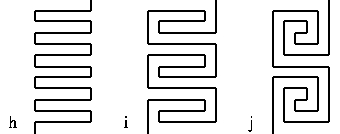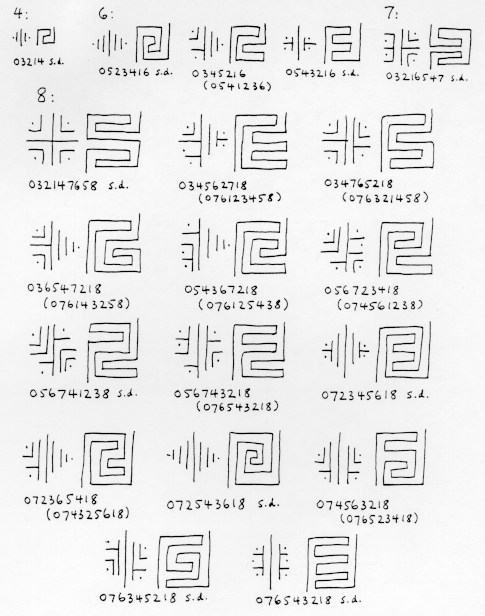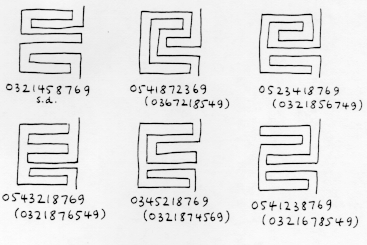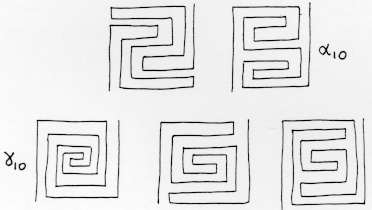| Through Mazes |
 |
to Mathematics |
| Through Mazes |
 |
to Mathematics |
This page in Polish
This page in Georgian

Now it is possible to list all of the possible s.a.t. mazes of a given
depth n, by looking at all the permutations of 0,...,n and
discarding those which do not meet the
three conditions which guarantee that
a sequence corresponds to a maze. In fact,
since odds and evens cannot mix in the permutation, and since 0 and n
must stay fixed, it is enough to look at all pairs of permutations,
one of the odd integers 1,...,n-1 (assuming n even), and one of
the even integers 2,...,n-2. For example, to construct all possible
8-level mazes, one must consider pairs of permutations of 1,3,5,7 and
of 2,4,6. There are 24 x 6 = 144 such pairs, so this can easily
be done by hand.
Here is what one finds for depths 1 through 8. In this list, the
non-"interesting" mazes (those can be constructed from
shallower mazes by adding trivial levels at the top and/or bottom)
have been omitted. This figure shows
the nuclei and rectangular mazepaths of these mazes;
only one representative of each dual
pair is drawn. See From rectangular path to nucleus for how these forms are related (added 3/14/2024).

Corrections (03/02/2024, 03/09/2024, 03/14/2024). In "The interesting mazes of 4,6,7 and 8 levels," 034562718 should be 034567218, and the dual of 056743218 is 076541238; also the nucleus for 056723418 is wrong: its right side should be the same as the right side of 072345618 or 034562718. Thanks to Dani Novak.
Here are the data in tabular form:
Depth Number of mazes Interesting mazes
1 1 none
2 1 none
3 1 none
4 2 03214
5 3 none
6 8 0523416 0543216
0345216 0541236
7 14 03216547
8 42 032147658 034567218 034765218
036547218 054367218 056723418
056741238 056743218 072345618
072365418 072543618 074325618
074561238 074563218 076123458
076125438 076143258 076321458
076345218 076523418 076541238
076543218
For depth 9 one would have to consider 24 x 24 = 576 permutations, and the possibilities of error increase. The following numbers were calculated using computers.
n M(n) I(n)
1 1 0
2 1 0
3 1 0
4 2 1
5 3 0
6 8 4
7 14 1
8 42 22
9 81 11
10 262 142
11 538 95
12 1828 1014
13 3926 808
14 13820 7796
15 30694 6980
16 110954 63386
17 252939 61725
18 933458 538534
19 2172830 558853
20 8152860 4740658
21 19304190 5171300
22 73424650 42969130
24 678390116
26 6405031050
28 61606881612
30 602188541928
32 5969806669034
Here M(n) and I(n) are the numbers of
mazes and of interesting mazes
of depth n. The values for 24, 26 and 28 were obtained by
Jim Reeds of Bell Labs by a method which does not seem to apply
to odd depth-numbers. The values for 30 and 32 are reported in
Lando and Zvonkin's 1993 paper as due
to V. R. Pratt.
The interesting 9-level mazes are shown this figure by
their rectangular maze-paths; again, only one representative of each dual
pair is drawn.

The next figure
shows the maze paths of the
5 self-dual very-interesting mazes
of depth 10; these are mazes which also have no internal sequences of
trivial levels.

Why did I get interested in this problem?
Where else do these numbers occur?
What else is known about the maze numbers?
Return to Main Maze Page
Return to Tony's Home Page